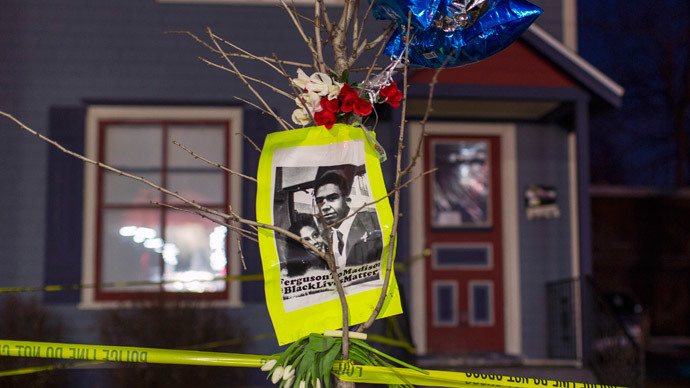Black teen’s behavior ‘should not be a death sentence’ – Wisconsin activist

Social justice activist Michael Bell Sr. fought for a decade to pass a law in Wisconsin requiring an independent investigation into officer-involved killings. He told RT that the behavior of unarmed teen Tony Robinson should not have led to his death.
Bell, a military veteran, pressed for the law after his son died in police custody in 2004. The first of its kind in the nation, the law was signed just two weeks ago.
Tony Robinson, 19, was shot by a Madison police officer on Friday as law enforcement responded to reports of battery and of a man creating a safety hazard by jumping in and out of traffic.
Speaking with RT, Bell said he was bothered by Robinson’s death.
“Just because a guy is darting in and out of traffic, that should not be a death sentence,” he said. “[My] own officer friends told me that this guy (the officer who shot Robinson) might have been very aggressive. He might have made some mistakes because, essentially, backup was 30 seconds away. This guy could have stood outside, waited for his backup to be there, and Tony Robinson might be alive today.”
Bell added that police-mounted body cameras would have been helpful in a situation such as this, where the only witness on record is the officer involved in the incident.
“We won’t know about the results of this until it comes out in the investigation. We also know that there were no eyewitnesses; that’s what I’ve been told,” he said to RT. “The only witness right now is the officer who killed this man and whatever his testimony is. There’s nobody to contradict him.”
Nearly 2,000 people protest fatal police shooting of #TonyRobinson in Wisconsin http://t.co/fVHeECDDyvpic.twitter.com/BX7xz961uh
— HuffPost BlackVoices (@blackvoices) March 10, 2015
The incident happened last Friday, March 6, when officer Matt Kenny, a 12-year veteran of the Madison Police Department, was responding to the reports of traffic interference. Kenny followed Robinson into an apartment building and forced his way in because he heard a disturbance. In an ensuing scuffle, Robinson was injured by gunfire, according to police.
READ MORE:Protest after ‘unarmed’ black 19 yo shot dead by Madison police
Kenny administered first aid, as did other officers who arrived at the scene, police said. Nevertheless, Robinson, a 2014 graduate of Sun Prairie High School, died of his wounds at a local hospital. Kenny is on administrative leave with pay during the state’s investigation. There have been street protests for the past four days since Robinson’s death.
Bell told RT that he began to question the justice system when the Kenosha Police Department in Wisconsin cleared the officers in the death of his son after investigating for only two days.
“It was very difficult. I mean, I’m a military pilot, I was flying for my country, I believe in democracy, and I knew there was a problem with the system, and when I questioned it, I was ignored,” said Bell.
“And, I mean, I was really bothered by it because I thought, ‘If I’m being ignored, what’s happening to other people and other races and other economic groups and so forth?’”
3Novices:Wisconsin Dad Recalls Son's 2004 Shooting Death by Police http://t.co/HK2VfYCbhX Michael Bell described fighting for a first-in-…
— 3novices (@3novices) March 9, 2015
Bell said that when he examined how the police officers in his son’s case were cleared, he found that no witnesses had been interviewed, crime lab evidence hadn’t been returned, and the police officers had rehearsed their testimonies for hours.
READ MORE:Wisconsin officer who shot unarmed man was exonerated in previous fatal shooting
He knew that wasn’t how investigations were supposed to work, so he sued the city, won a $17.5 million settlement, and created a billboard campaign to raise awareness about the injustice of the police investigating themselves. The campaign used provocative messages like “Name one police department that found itself unjustified” and “Good cops are the quiet majority,” as well as “When police kill, should they judge themselves?”
The campaign upset the local police union, which started a backlash campaign. Bell's work caught the attention of the Kenosha mayor and the US Attorneys Office. That is when he pushed for a bill to change the outcome when death occurs in police custody, he told RT.
READ MORE: Protests over death of unarmed black man in Madison reach fourth straight day
As he worked on a proposal, Bell said the bill had three parts. One part would involve an officer being drug tested to ensure they were clean during an incident. The second part would mandate an independent investigation, and the third part would include a comprehensive review of the entire incident.
“We were only able to get the second element ‒ external investigation ‒ complete, but still, it was the first time in the nation that a whole state mandated through legislation that police-involved deaths be investigated externally,” he told RT.
Bell maintained that the only way that such a process can succeed is with the help of law enforcement.
“One of the things I have to say here is that we couldn’t have got it done without police officers. I worked along with the director of the Wisconsin Professional Police Association; I worked along with the director of the Badger State Sheriffs' Association. We all came together, and with legislators and law enforcement and criminal justice and criminal law professors, we formulated this bill and we were able to get it done.”












